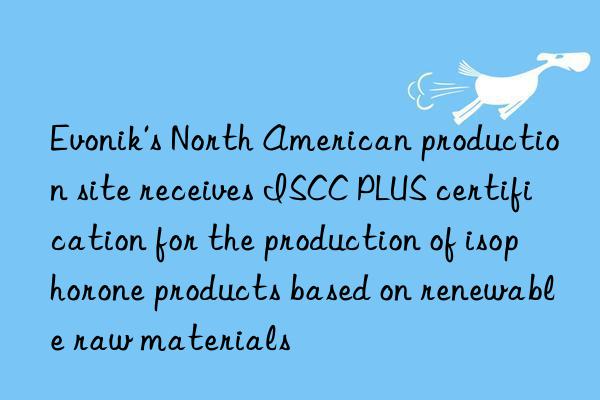
Evonik’s plant in Mobile, Alabama, USA, receives ISCC for its use of renewable acetone in the production of isophorone products PLUS certified. Certification of the Mobile plant enables Evonik to produce and sell renewable isophorone-based VESTA in the United States for the first time eCO series. In 2022, after Evonik's production base in Herne, Germany, obtains certification, production of this series of products will begin in Europe.
Acetone made from renewable biocyclic materials derived from industrial waste, such as waste cooking oil, combined with existing feedstocks, enables Evonik to offer products on the market containing isophorone, isophoronediamine and isophorone. Renewable isophorone platform for phorone diisocyanate products. By reducing its reliance on fossil-based acetone, Evonik is reducing the carbon footprint of its own production while also supporting customers in the region with their own sustainability, CO2 reduction and environmental regulatory needs.
In order to obtain ISCC PLUS certified, Evonik's use of renewable raw materials is independently certified by mass balance accounting principles and external audits. According to the mass balance method, VESTANAT® IPDI eCO products contain 75% renewable carbon and have significantly lower global warming potential (GWP) and CO2 footprint than fossil-based products.
Christian Schmidt, head of Evonik’s Crosslinking Agents business, said: “This latest ISCC certification enables us to produce VESTA on a large scale. eCO range of products and provide cost-effective and sustainable solutions to customers in the region. Providing our customers with reliable carbon footprint information so they clearly understand their options to reduce emissions. This is another step on our sustainability journey to achieve climate neutrality in the industries we support. "
ISCC (International Sustainability & Carbon Certification) is an independent third-party initiative considered the leading certification for sustainable, fully traceable, deforestation-free and climate-friendly supply chains.
John Duggan, head of Evonik’s crosslinkers business in the Americas, said: “From renewable raw materials and our production to consumer purchases ISCC PLUS certified products, we can track every renewable molecule used throughout our supply chain. Therefore, even if we mix different feedstocks, we are able to reduce the overall carbon footprint, with the ultimate goal of utilizing 100% renewable feedstocks to further reduce the carbon footprint. "

 微信扫一扫打赏
微信扫一扫打赏

